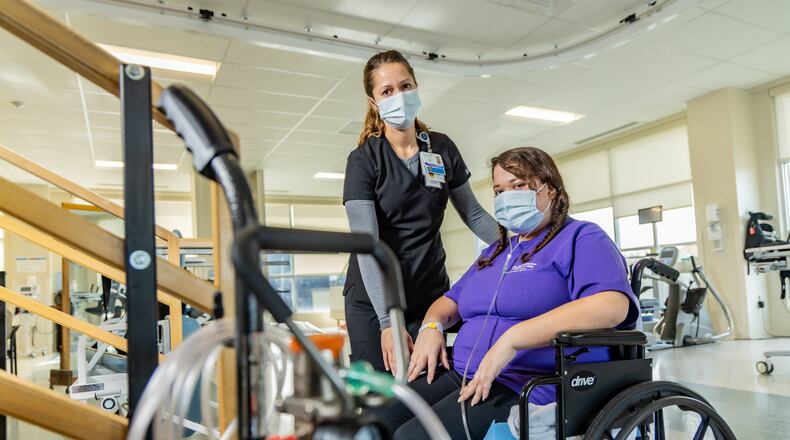The filmmaker from West Milton was comatose for nearly two months while being sustained by life support machines. She remains on oxygen today.
Mary Nelson, a 55-year-old lawyer from Lewisburg, also thought it couldn’t happen to her. She walked miles every day. Plus she had COVID-19 in January 2021 and didn’t get overly sick. After being hospitalized for COVID-19 for three weeks in November, she still uses a walker and oxygen at night.
Stanley and Nelson are among more than 17,000 who have been hospitalized with COVID-19 in the Dayton region over the course of the pandemic. Both were unvaccinated.
Both women came close to death. Their stories illustrate how grueling and life-altering COVID-19 can be for some.
Dr. Vincent Nardy, who cared for Stanley while she was at Miami Valley Hospital, said just because it doesn’t happen to everybody, doesn’t mean it can’t be you. And it can be difficult to predict who will become seriously ill.
“We hear it all the time: ‘I never expected to get this sick from this, I never knew it could be this bad.’ A lot of us just want to say, ‘We’ve tried to tell you,’” Nardy said. “It’s just very difficult to see some people making what they feel is a good decision (to not get vaccinated) based on bad information and suffering the consequences or their family suffering the consequences.”
Dayton-area residents are being hospitalized in record numbers. Hundreds are dying, and thousands more will still be recovering long after they leave the hospital. The vast majority are unvaccinated.
On Monday, the West Central Ohio region — which includes Dayton — set a record for patients hospitalized with COVID-19: 652.
“Some people still believe that COVID doesn’t exist, that it’s not real,” Stanley said. “But I just want people to be cautious and aware … So many people have lost their lives. It’s not a joke, and it’s a very scary thing.”
Months of life lost
After Stanley was hospitalized, her condition deteriorated rapidly. She was intubated and placed on a ventilator. But it wasn’t enough.
Nardy, the adult ECMO medical director at Miami Valley Hospital, determined Stanley was a good candidate to receive extracorporeal membrane oxygenation or ECMO.
ECMO is a therapy that pumps blood out of the body to a machine that operates like a heart and lungs by filtering out carbon dioxide and sending oxygen-filled blood back to the body. This way, Stanley’s heart and lungs could rest and heal.
Miami Valley Hospital was the first in Dayton to offer the therapy. The hospital has four machines but currently only enough staff to support one adult patient on ECMO at a time.
Still, things were touch and go for Stanley. After more than six weeks, the ECMO team talked with her mother about possibly withdrawing support and making her comfortable while she passed away.
Luckily, a few days later, Stanley’s condition turned and she started to recover. When she woke up in October, she had missed about two months of her life (including her best friend’s wedding where she was supposed to be the maid of honor). Months of being bedridden had weakened her body.
Stanley had to relearn how to stand and how to walk through several rounds of physical therapy. Because her vocal cords went unused for so long, she’ll need speech therapy soon.
“It was like being born again in a way, because you’re doing everything again for the first time,” she said.
Stanley didn’t get vaccinated because she said she had concerns about the speed with which the shots were developed. But now she understands the vaccine would have improved her chances of not going through what she went through and recovering quicker.
Desperate visions
Nelson tried to be cautious during the pandemic. But after a trip to her stepdaughter’s homecoming at Oklahoma State University in late October, she and her husband contracted COVID-19.
In early November, Nelson was battling against COVID-19 at home and losing. By the time she went to the hospital, she hadn’t eaten in a week and said she was out of her mind from low oxygen levels in her blood.
When she was put in a coma and on a ventilator for 12 days, Nelson had visions. In every scenario, she was desperately ill and trying to get help.
“I remember being scared in every one of them because I thought I was dying,” she said.
Nelson didn’t get vaccinated on the advice of her doctor because of a rare immune condition. Many family members, including her two daughters, got the shot after they witnessed her battle with COVID-19.
Nelson wants people to take COVID-19 seriously. She’s still exhausted and dealing with the fallout from the illness.
“I did take it seriously, but apparently not seriously enough,” she said. “It doesn’t matter how healthy you are. This disease can kill you. It came close to doing that to me.”
About the Author

